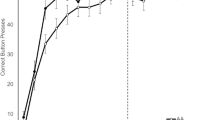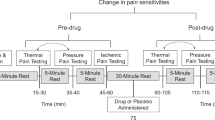Greater trait anger-out is associated with elevated pain responsiveness. Previous work suggests this effect may be mediated by deficient endogenous opioid analgesia, possibly reflecting diminished opioid receptor sensitivity. The A118G single nucleotide polymorphism (SNP) of the mu opioid receptor gene influences both opioid receptor sensitivity and clinical responsiveness to opioid analgesics. Therefore, this study tested whether this SNP either mediated or moderated the effects of anger-out on postsurgical pain outcomes. Forty-eight patients undergoing coronary artery bypass graft surgery provided genetic samples, and completed measures of anger-out and postsurgical pain. Postsurgical opioid analgesic use was also recorded. Anger-out was positively associated with postsurgical pain ratings (p < 0.05). Anger-out was not associated with A118G SNP status (p > 0.10), suggesting the latter is unlikely to mediate anger-out's pain-related effects. A significant anger-out × A118G interaction was observed on analgesic use (p < 0.05), due to a much stronger positive relationship between anger-out and analgesic demands in patient with the A118G SNP (b = 0.53) than those with the wild-type receptor (b = 0.07). These results suggest that the A118G SNP may moderate but not mediate the effects of anger-out on postoperative pain responses.

Similar content being viewed by others
REFERENCES
Aiken, L. S., and West, S. G. (1991). Multiple Regression: Testing and Interpreting Interactions, Sage, Thousand Oaks, CA.
Baron, R. M., and Kenny, D. A. (1986). The moderator–mediator variable distinction in social psychological research: Conceptual, strategic, and statistical considerations. J. Pers. Soc. Psych. 51: 1173–1182.
Bond, C., LaForge, K. S., Tian, M., Melia, D., Zhang, S., Borg, L., Gong, J., Schluger, J., Strong, J. A., Leal, S. M., Tischfield, J. A., Kreek, M. J., and Yu, L. (1998). Single-nucleotide polymorphism in the human mu opioid receptor gene alters beta-endorphin binding and activity: Possible implications for opiate addiction. Proc. Natl. Acad. Sci. U.S.A. 95: 9608–9613.
Bouchard, T. J., and Loehlin, J. C. (2001). Genes, evolution, and personality. Behav. Genet. 31: 243–273.
Bruehl, S., Burns, J. W., Chung, O. Y., Ward, P., and Johnson, B. (2002). Anger and pain sensitivity in chronic low back pain patients and pain-free controls: The role of endogenous opioids. Pain 99: 223–233.
Bruehl, S., Chung, O. Y., Burns, J. W., and Biridepalli, S. (2003). The association between anger expression and chronic pain intensity: Evidence for partial mediation by endogenous opioid dysfunction. Pain 106: 317–324.
Burns, J. W., and Bruehl, S. (in press). Anger management style, opioid analgesic use, and chronic pain severity: A test of the opioid-deficit hypothesis. J. Behav. Med.
Burns, J. W., Bruehl, S., and Caceres, C. (2004). Anger management style, blood pressure reactivity and acute pain sensitivity: Evidence for a Trait × Situation model. Ann. Behav. Med. 27: 195–204.
Burns, J. W., Johnson, B. J., Devine, J., Mahoney, N., and Pawl, R. (1998). Anger manger management style and prediction of treatment outcome among male and female chronic pain patients. Behav. Res. Ther. 36: 1051–1062.
Caraco, Y., Maroz, Y., and Davidson, E. (2001). Variability in alfentanil analgesia may be attributed to polymorphism in the mu opioid receptor (abstract). Clin. Pharmacol Ther. 69: p63/OII-A-4.
Casey, K. L., Svensson, P., Morrow, T. J., Raz, J., Jone, C., and Minoshima, S. (2000). Selective opiate modulation of nociceptive processing in the human brain. J. Neurophysiol. 84: 525–533.
Chou, W. Y., and Hsu, C. J. (2004). Genotype influences the effect of patient-controlled analgesics in patients after knee arthroplasty (abstract). In Proceedings of the 71st annual meeting of the American Academy of Orthopaedic Surgeons, San Francisco, CA.
Comings, D. E., Johnson, J. P., Gonzalez, N. S., Huss, M., Saucier, G., McGue, M., and MacMurray, J. (2000). Association between the adrenergic alpha 2A receptor gene (ADRA2A) and measures of irritability, hostility, impulsivity, and memory in normal subjects. Psychiatr. Genet. 10: 39–42.
Davidson, R. J., Putnam, K. M., and Larson, C. L. (2000). Dysfunction in the neural circuitry of emotion regulation—A possible prelude to violence. Science 289: 591–594.
Dougherty, D. D., Shin, L. M., Alpert, N. M., Pitman, R. K., Orr, S. P., Laska, M., Macklin, M. L., Fischman, A. J., and Rach, S. L. (1999). Anger in healthy men: A PET study using script-driven imagery. Biol. Psychiatry 46: 466–472.
Fillingim, R. B., Kaplan, L., Staud, R., Ness, T. J., Glover, T. L., Campbell, C. M., Mogil, J. S., Wallace, M. R. (2005). The A118G single nucleotide polymorphism of the mu-opioid receptor gene (OPRM1) is associated with pressure pain sensitivity in humans. J. Pain 6: 159–167.
Gelernter, J., Kranzler, H., and Cubells, J. (1999). Genetics of two mu opioid receptor gene (OPRM1) exon I polymorphisms: Population studies, and allele frequencies in alcohol- and drug-dependent subjects. Mol. Psych. 4: 476–483.
Gelkopf, M. (1997). Laboratory pain and styles of coping with anger. J. Psychol. 131: 121–123.
Hirota, T., Ieiri, I., Takane, H., Sano, H., Kawamoto, K., Aono, H., Yamasaki, A., Takeuchi, H., Masada, M., Shimizu, E., Higuchi, S., and Otsubo, K. (2003). Sequence variability and candidate gene analysis in two cancer patients with complex clinical outcomes during morphine therapy. Drug Metab. Dispos. 31: 677–680.
Keefe, F. J., Lumley, M., Anderson, T., Lynch, T., and Carson, K. L. (2001). Pain and emotion: New research directions. J. Clin. Psychol. 57: 587–607.
Kerns, R. D., Rosenberg, R., and Jacob, M. C. (1994). Anger expression and chronic pain. J. Behav. Med. 17: 57–67.
Klepstad, P., Rakvag, T. T., Kaasa, S., Holthe, M., Dale, O., Borchgrevink, P. C., Baar, C., Vikan, T., Krokan, H. E., and Skorpen, F. (2004). The 118 A > G polymorphism in the human mu-opioid receptor gene may increase morphine requirements in patients with pain caused by malignant disease. Acta. Anaesthesiol. Scand. 48: 1232–1239.
Lotsch, J., Skarke, C., Grosch, S., Darimont, J., Schmidt, H., and Geisslinger, G. (2002). The polymorphism A118G of the human mu-opioid receptor gene decreases the pupil constrictory effect of morphine-6-glucuronide but not that of morphine. Pharmacogenetics 12: 3–9.
Lotsch, J., Skarke, C., Liefhold, J., and Geisslinger, G. (2004). Genetic predictors of the clinical response to opioid analgesics: Clinical utility and future perspectives. Clin. Pharmacokinet. 43: 983–1013.
Manuck, S. B., Flory, J. D., Ferrell, R. E., Dent, K. M., Mann, J. J., and Muldoon, M. F. (1999). Aggression and anger-related traits associated with a polymorphism of the tryptophan hydroxylase gene. Biol. Psychiatry 45: 603–614.
Materazzo, F., Cathart, S., and Pritchard, D. (2000). Anger, depression, and coping interactions in headache activity and adjustment: A controlled study. J. Psychosom. Res. 49: 69–75.
Melzack, R. (1987). The short form of the McGill pain Questionnaire. Pain 30: 191–197.
Millan, M. J. (2002). Descending control of pain. Prog. Neurobiol. 66: 355–474.
Mormede, P., Courvoisier, H., Ramos, A., Marissal-Arvy, N., Ousova, O., Desautes, C., Duclos, M., Chaouloff, F., and Moisan, M. P. (2002). Molecular genetic approaches to investigate individual variations in behavioral and neuroendocrine stress responses. Psychoneuroendocrin 27: 563–583.
Price, D. D. (2000). Psychological and neural mechanisms of the affective dimension of pain. Science 288: 1769–1772.
Sayar, K., Gulec, H., and Topbas, M. (2004). Alexithymia and anger in patients with fibromyalgia. Clin. Rheumatol. 23: 441–448.
Schlaepfer, T. E., Strain, E. C., Greenberg, B. D., Preston, K. L., Lancaster, E., Bigelow, G. E., Barta, P. E., and Pearlson, G. D. (1998). Am. J. Psychiatry 155: 470–473.
Spielberger, C. D., Johnson, E. H., Russell, S. F., Crane, R. J., Jacobs, G. A., and Worden, T. J. (1985). The experience and expression of anger: Construction and validation of an anger expression scale. In M. A. Chesney, and R. H. Rosenman, (Eds.), Anger and Hostility in Cardiovascular and Behavioral Disorders, Hemisphere, Washington, DC, pp. 5–30.
ACKNOWLEDGMENTS
This project was supported in part by grants NS046694 (S.B. and O.Y.C.), MH067244 (J.W.B.), and HL04476 (BSD), and General Clinical Research Center Grant #RR-00095 from the National Institutes of Health. The authors gratefully acknowledge the contributions of Rand S. Valery, BS (laboratory manager), Gwen Wissel, BA (research technician), Lisa Rush, MS (data manager), and Richard Call, BS (research technician) from the Department of Anesthesiology, Vanderbilt University; and the Vanderbilt University Program in Human Genetics DNA Resources Core for their fine technical and informatics assistance
Author information
Authors and Affiliations
Corresponding author
Rights and permissions
About this article
Cite this article
Bruehl, S., Chung, O.Y., Donahue, B.S. et al. Anger Regulation Style, Postoperative Pain, and Relationship to the A118G Mu Opioid Receptor Gene Polymorphism: A Preliminary Study. J Behav Med 29, 161–169 (2006). https://doi.org/10.1007/s10865-005-9030-7
Received:
Accepted:
Published:
Issue Date:
DOI: https://doi.org/10.1007/s10865-005-9030-7




